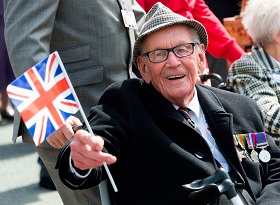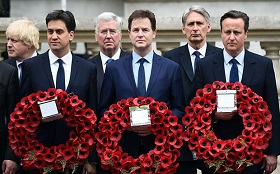The 70th anniversary of the end of World War II is a major celebration for the United Kingdom. The British people commemorate the victims of this world war. Though, in the spring of 2015, the British public was preoccupied with the election campaign (the general election was held on the eve of the VE Day celebrations, on 7 May 2015), Britain celebrated the 70th anniversary on a large scale.
The 70th anniversary of the end of World War II is a major celebration for the United Kingdom. The British people commemorate the victims of this world war. Though, in the spring of 2015, the British public was preoccupied with the election campaign (the general election was held on the eve of the VE Day celebrations, on 7 May 2015), Britain celebrated the 70th anniversary on a large scale. Like in most European countries, Victory Day in Britain is celebrated on 8 May – the day on which Winston Churchill formally announced to the British nation that the war in Europe was over. The programme of the three-day commemorations to mark the end of the war in Europe was agreed back in 2015. William Hague, Speaker of the House of Commons, said he was happy to announce the planned events to pay due respect to those who did so much for the country’s defence and victory in Europe. From 8 to 10 May 2015, memorial ceremonies and remembrance services were held in Britain, along with wreath-laying ceremonies, meetings with war veterans and festive concerts.
Victory Day 2015
On 8 May 2015, a two-minute silence was observed at London’s Cenotaph memorial dedicated to those killed in both world wars. Then the leaders of Britain’s biggest political parties, including David Cameron of the Conservative Party, Labour's Ed Miliband and Liberal Democrat Nick Clegg (the two latter politicians announced their resignations following defeat in the general election) laid red poppy wreaths – symbols of war victims. In the evening, more than 200 beacons were lit all over the country. On Sunday 10 May, the Royal Family, including Queen Elizabeth II, and Prime Minister David Cameron attended a thanksgiving service in Westminster Abbey. It was followed by a Parade of the Horse Guards in which war veterans took part.
Britain made an important contribution to the victory over Nazi Germany, having lost some 600,000 troops, including British soldiers. The Anglo-Soviet Agreement on joint actions against Germany was signed on 12 July 1941. Ordinary Britons felt sympathy for the USSR as an ally in the anti-German coalition and the Soviet Union became especially popular following the Red Army’s victory in the battles for Moscow and Stalingrad. During the war, Britain provided significant help to the USSR, with British aircraft involved in military operations on the Soviet-German front, and so-called Arctic convoys were also of great importance.
Arctic convoys – common contribution to victory
The Arctic convoys of World War II are one of the bright and tragic pages in the history of Russia and Britain. The convoys to deliver and escort essential supplies (equipment, arms and food products) of strategic importance for the USSR were organised by Britain at the very beginning of the war. The first convoy, named “Dervish”, reached Arkhangelsk on 31 August 1941. Later, assistance was provided under the Lend-Lease programme and allied convoys sailed from Loch Ewe and Scapa Flow in Scotland to Russia’s northern ports of Murmansk and Arkhangelsk. From 1941 to 1945, British ships escorted 78 convoys through the Barents Sea, delivering some 4 million tonnes of supplies, including over 5,000 and 7,000 aircraft. The convoy operations were extremely dangerous, with many hazards such as bad weather conditions and tough resistance by German forces. The convoyed ships were escorted by British ships and aircraft and by the Northern Navy of the USSR. Winston Churchill described the convoys as “the worst journey in the world”. In the period from 1941 to 1945, 87 merchant vessels and 18 Royal Navy ships were lost, and over 3,000 British servicemen died. A Russian Arctic Convoy Museum has been opened in the Scottish village of Aultbea, on the shores of Loch Ewe.
The only Arctic convoy ship that has survived is HMS Belfast, a legendary cruiser that played the key role in the Battle of the North Cape in 1943. It is a museum ship now, permanently moored in London. In 2010, the light cruiser was restored with the help of Russian experts. The museum’s opening ceremony was attended by the Duke of Edinburg, Queen Elizabeth II’s husband, who himself took part in the Arctic convoys. On 19 March 2010, the Belfast cruiser received an award from the Supreme Commander of the Russian Armed Forces “for the courage and heroism exhibited by the cruiser’s crew in escorting transport convoys.” During the Victory Day celebrations in London, Russian and British war veterans traditionally meet on board the Belfast to commemorate their colleagues. The celebration ends to the sounds of Tchaikovsky’s 1812 Overture, echoed by the cruiser’s cannons.
Russia did its best to enable the British veterans involved in the Arctic convoys to be awarded with Medal of Ushakov, which was established in 1944 for navy troops for courage and valour in battle. In 2012, the Russian government applied to the Foreign Office requesting the possibility of awarding Ushakov Medal to the British veterans of World War II. The Foreign Office refused, however, citing the law restricting British citizens’ rights to receive foreign awards. Yet this decision prompted much criticism on the part of civil society campaigners, Russian expats in Britain and members of the House of Commons. The government’s decision was revised, as an exception. In June 2013, the first 20 veterans received awards from the hands of Russian President Vladimir Putin and Prime Minister David Cameron. According to Decree of the President of Russia, the Ushakov Medal was awarded to some 3,000 British troops.
“Diplomacy of anniversaries” and historical memory
Despite the shared historical memory and mourning for the war victims, a visit by British leaders to Russia's Victory Day parade on 9 May remains a political issue. Russia began inviting foreign leaders back in 1995. In that year, the parade to mark the 40th anniversary of Victory Day was attended by British Prime Minister John Major. In 2005, Tony Blair declined Russia’s invitation to attend the 60th anniversary celebration, citing the need to shape a new Cabinet after a general election. Instead, he sent his deputy, John Prescott. In 2010, Gordon Brown abandoned his trip to Moscow following defeat in the election. And in 2015, David Cameron, like most western leaders, refused to come in protest against Russia’s position on Ukraine.
Interestingly, the first Victory Day parade in Moscow, on 9 May 1945, was attended by Clementine Churchill, the wife of the British Prime Minister. After Germany invaded the USSR, she came forward with the idea of setting up an Aid to Russia Fund sponsored by the British Red Cross and the Order of St John of Jerusalem. The fund operated until 1948, delivering supplies to the USSR totalling an estimated GBP 8 m, including medicines, hospital equipment, surgical tools, X-ray systems, food products, clothing, blankets, prosthetic appliances, etc. Two hospitals were opened in the USSR on Clementine Churchill’s initiative, symbolising the two country’s solidarity in the war. Mrs Churchill arrived in Moscow in April 1945 and met Victory Day in the Soviet capital. She addressed the Soviet people on Moscow radio saying: “It is my firm belief that on the friendship and understanding between the British and Russian peoples depends the future of mankind.” Lady Clementine Churchill was awarded the Order of the Red Banner of Labour “for outstanding merit in conducting public events aimed at collecting funds in Britain to help the Red Army.”
Despite efforts by the British leadership to distance themselves from Moscow’s celebrations, the 70th anniversary was an important and memorable event for the veterans who fought together in World War II. Ten British veterans of the Arctic convoys came to St Petersburg to celebrate.
In Moscow, the United Kingdom was represented by Winston Churchill’s grandson, Sir Nicholas Winston Soames, former defence minister (1994-1997). In his formal address to the British and Russian veterans read on 8 May 2015 by the British Consul General in St Petersburg, he said: “I am encouraged to hear that Russia continues to remember our shared history and sacrifice.”
Despite the complicated history of the Russian-British relations, Russia and Britain are united by the common losses suffered and the victory shared. The desire of Britain’s political leaders to lend a political touch to the Victory Day celebrations and to boycott the commemorations in Moscow as punishment for its ‘wrong’ policy is a destructive solution. According to Mary Dejevsky, a reporter with the Independent, boycotting the Victory Day parade is a lost opportunity to understand Russia. Coverage of the military parade in Red Square by the British media boiled down to commentaries in terms of “demonstration of strength” and “muscle-flexing”. Yet it did not go unnoticed that, in his speech, Vladimir Putin thanked the people of Britain, France and the United States for their contribution to the victory.
Today, it is more important than ever preserve and pass on to the younger generation the memory about these heroic pages in Russian-British history. There are concerns that, as witnesses to those terrible years – the British and Soviet veterans who contributed to the common victory – die, so will the common heroic history disappear from memory.
An opinion poll among young Britons aged 18 to 25 revealed depressing figures: more than half the respondents were unaware that the anniversary of the end of World War II in Europe was commemorated on 8 May. They were also unable to answer which British Prime Minister announced the end of the war: 7% of those polled said it was announced by Margaret Thatcher and 4% suggested it was Tony Blair. In another opinion poll conducted by YouGov in early May 2015, most British respondents said it was the United Kingdom that made the biggest contribution to the victory over Nazism.







